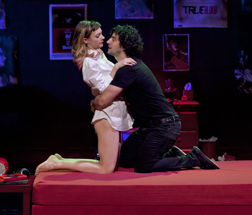By Lucy Komisar
A box spring and mattress covered in red sheets and blanket occupies center stage. A dozen posters, including “Gone With the Wind” and “True Blood” (about vampires), cover the back wall, and to the side is a red wardrobe with clothes and stuffed toys.
Annabella (Lydia Wilson), a young woman in black leggings, puts on rock music and dances to it. Wilson plays her as she might an insouciant high-fashion model. Men in suits come on the stage prancing, knees jutting up to the disco beat.
This is Parma, and a bloody story of incest and revenge will be told, though not exactly as 17th-century author John Ford had in mind. It‘s a stunning campy melodrama by Britain‘s inimitable Cheek by Jowl company. Director Declan Donnellan is a truly original talent who is honest to the text at the same time that he spoofs it. Doing it any other way would be crude and cruel.

The notion of incest as an amusement of juveniles is suggested as Annabella and her brother Giovanni (Jack Gordon), a student just returned from Bologna, play with sock puppets. He is in love with her. Gordon shows us a nervous, psychologically impaired young man.
Conflict upon conflict ensues as suitors vie for Annabella‘s hand. The noble Sorzano (Jack Hawkins) seems to have the best chance, but Hippolita (Suzanne Burden), an older woman who he‘d promised to marry on the death of her husband, plots against her faithless former lover. Burden makes her an utterly modern vengeful lady. A friar (Ryan Ellsworth) goes around telling everyone to behave.
Two rivals for Annabella have a go at it in their undershirts as a crowd gathers around yelling, egging them on. Almost everything in the play takes place in or around that red bed, often with other characters as an audience. When the combat ends, one of the fighters opens a door into the bathroom and pulls down his drawers as he enters the stall shower. He will reappear with a towel around his waist.
Sorzano (Hawkins makes him rather a self-involved charmer) arrives on the scene to 40s music, with a rose in his teeth.
There will be sex between the siblings, which Annabella accepts rather lackadaisically, as if, why not? Giovanni afterwards goes bare-assed into the glistening white bathroom. The maid Putana (Lizzie Hopley), who of course speaks in Cockney and whose name in Italian curiously means whore, freshener-sprays the room air and sheets. An appropriate time passes, and Annabella has morning sickness and (pretend) throws up into a bowl. The friar soon tells her she will go to hell.
But that Cliff Notes summary of the play is as empty of substance as the cheat sheets. Now think of a celebration featuring a Conga line, with the friar in robe and sandals bringing up the rear. Or a wedding party where Hippolita, a masked intruder, holds a microphone and serenades the guests with cabaret-style crooning.
John Ford published the play in 1633, about a decade or two after Shakespeare died. I think he was trying to outdo the Bard in shock value as well as gore. Of the latter there is plenty – even more in the original script than this adaptation, which is hard to believe. I’ll spare you the details, but a lot of the red stuff splatters. Of the incest, that is so stylized that Annabella‘s passion for her brother is not at all believable. So modern audiences will find this play a lot less offensive than viewers did at the time it was first performed and in more recent centuries.
In fact, they might find it bloody good fun.
“ ˜Tis Pity She‘s a Whore.” Written by John Ford, adapted by Cheek by Jowl; directed by Declan Donnellan. Cheek by Jowl at the Brooklyn Academy of Music, Harvey Theater, 651 Fulton St., Brooklyn. 718-636-4100. Subway stop Nevins Street. Opened March 21, 2012, closes March 31, 2012.

